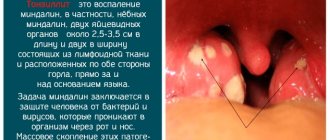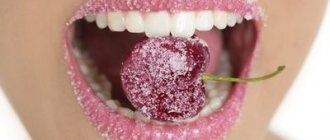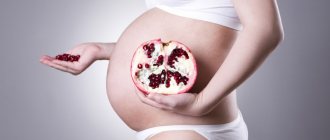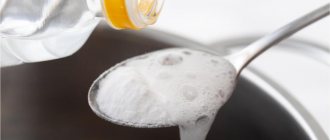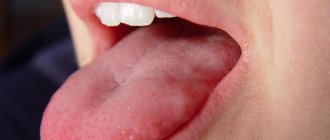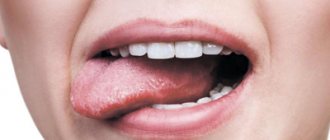Why does my mouth hurt?
Pain in the mouth can be caused by both local and systemic factors. Painful sensations in the oral cavity usually do not bother you in isolation. As a rule, they are combined with other symptoms characteristic of a certain pathology: hyperemia and swelling of the mucous membrane, rashes and ulcers in the oral cavity, plaque, unpleasant odor, difficulty chewing and opening the mouth, and salivation. Pain in the mouth, despite its local nature, disrupts general well-being and performance, and prevents normal diction and proper food intake.
Lip pain
Is local or diffuse in nature. It can be caused by traumatic, infectious, chemical, physical factors, or tumor lesions. The pain is usually combined with dry lips, cracks, redness, blistering rashes, ulceration, and dry crusts. Common causes of lip pain:
- Cheilitis.
It may be a consequence of sensitization (allergic cheilitis), neurogenic causes (exfoliative, macrocheilitis), unfavorable climatic factors (meteorological cheilitis), vitamin deficiency (hypovitaminous cheilitis), infection (glandular cheilitis). Common signs are damage to the red border, accompanied by dryness, painful cracks and ulcers, swelling, burning, itching. - Labial herpes.
In the prodromal period, local tingling, tingling, itching in the area of the upper or lower lip is noted. Then a bubble containing liquid appears. After spontaneous or forced opening of the vesicle, an ulcer forms in its place, which dries out and becomes covered with a scab. When the crust cracks, ichor oozes out from under it. Elements of herpes are sharply painful at all stages. It takes 10-12 days from the prodrome to complete epithelialization. - Lichen planus.
May affect the red border of the lips, tongue, and oral mucosa. The main elements are papules, which, when fused, form whitish areas of keratinization. Sometimes LLP occurs with the formation of weeping areas, erosions, blisters - in these cases, a burning sensation and severe pain in the mouth are added, making it impossible to eat. - Trigeminal neuralgia.
Trigeminal neuralgia is a common cause of facial pain. When the maxillary and mandibular branches of the trigeminal nerve are damaged, sharp, intense shooting pains in the cheek, upper or lower lip, or jaw, reminiscent of electric shocks, may occur. - Injuries.
Lip burns can be caused by drinking hot drinks, exposure to harsh chemicals, or exposure to sunlight or open flames. With mild burns, pain, swelling of the lip, and hyperemia appear; in severe cases, blisters, scabs, and tissue necrosis form. Mechanical damage (cuts, biting) to the lips is accompanied by pain and bleeding. - Lip cancer.
Externally it may appear as a warty or papillomatous growth or infiltrate. At first, the elements do not cause discomfort, but their ulceration, infection, and decay are accompanied by severe pain in the mouth.
Transient swelling and soreness of the lips are observed after a number of cosmetic procedures and surgical interventions: permanent makeup, piercing, injection of hyaluronic fillers, cheiloplasty.
Mouth pain
Pain in gums
As a rule, it is associated with diseases of the oral cavity or behavioral factors (incorrect selection of a toothbrush, use of toothpicks, smoking). Pathologies that cause pain in the gums:
- Inflammatory processes.
Painful sensations in the mouth are a pathognomonic sign of inflammatory diseases: gingivitis, stomatitis, periodontitis. With gingivitis, the gums become swollen, painful, and bleeding. Stomatitis can occur with the formation of plaque in the mouth, extremely painful aphthae and ulcers. With periodontitis, pain in the gums is aggravated by bad breath, the formation of periodontal pockets, suppuration, and loosening of teeth. - Periodontitis.
In acute periodontitis or exacerbation of a chronic process, painful swelling of the gums occurs in the area of the affected tooth. When the pyogenic flora is activated, a flux is formed, accompanied by throbbing pain. When it is opened, a fistula may form. Severe pain occurs during chewing and speaking. - Injuries.
Damage to the gums can occur both from direct mechanical impact and from difficult tooth eruption. In the latter case, pericoronitis develops. Injury to gum tissue and pain are also accompanied by dental procedures: tooth extraction, installation of a dental crown/prosthesis, dental implantation, operations (gingivotomy, gingivoplasty, etc.). - Allergy.
May be caused by a reaction to denture materials, medications, or local anesthetics. It occurs in the form of allergic stomatitis, cheilitis, glossitis. Characterized by hyperemia, burning, swelling of the mucous membrane, hypersalivation, pain when eating.
Tongue pain
Pain in the tongue is associated with local infectious-inflammatory, traumatic, allergic, neurogenic, and neoplastic processes. In addition to local factors, pain in the mouth can be provoked by systemic diseases: hypovitaminosis B1, B2, B12, pellagra, iron deficiency anemia, collagenosis, leukemia, etc. Local causes of pain in the tongue:
- Glossitis.
Pain of varying intensity is observed with desquamative, candidal, herpetic, allergic, traumatic and other glossitis. Swelling, glossodynia, plaque, and changes in taste sensitivity may also occur. - Xerostomia.
It is a consequence of radiotherapy, chemotherapy, medication, smoking, Sjogren's disease, diseases of the salivary glands. Dry mouth makes eating, swallowing, and speaking difficult and painful. - Glossalgia.
It occurs with attacks of burning pain in the tongue, which are more pronounced in its tip and lateral surfaces. There is hyperemia or pallor of the tongue. Repeated painful attacks change the psychological state of patients - they become irritable, suspicious, and tearful. - Galvanism.
Develops as a result of irrational prosthetics. It is characterized by swelling and hyperemia of the tongue, sensations of pain, burning, rawness, and a metallic taste in the mouth. - Neuropathies.
Pain in the tongue of neurogenic origin occurs with neuralgia of the glossopharyngeal and hypoglossal nerves. In the first case, the pain is localized in the area of the root of the tongue, in the second - in the back of the tongue. More often it is unilateral in nature, occurs in paroxysms, and is provoked by talking, coughing, and swallowing. It has an intense pulsating, drilling, burning character. - Tongue cancer.
Manifests with the appearance of painless or slightly painful formations: growths, ulcers, compactions. In the advanced stage, local or diffuse pain occurs, radiating to the jaw, ear, and temporal region. Salivation increases, foul breath appears, spontaneous bleeding from the tongue, difficulty articulating and swallowing.
Dental diagnostics
Causes of discomfort
The taste in the mouth tells about the health of the whole body.
The reasons for the appearance of acid in the oral cavity can be both diseases of various organs and a joyful event - the onset of pregnancy.
Possible diseases that cause an unpleasant aftertaste:
- increased acidity of gastric juice;
- excess production of hydrochloric acid;
- disturbances in the gastrointestinal tract - pancreas, reflux disease;
- periodontal diseases;
- the presence of crowns or fillings made of different metals in the oral cavity - such combinations form a galvanic couple and a physical and chemical reaction of electrolysis takes place in the oral cavity;
- electrolyte imbalance;
- dehydration of the body;
- taking medications;
- impaired bile formation and liver pathology - as a result of eating fatty and heavy foods; pregnancy in the middle and late stages - the growing uterus compresses the stomach and hydrochloric acid refluxes into the esophagus and oral cavity.
All these processes are accompanied by additional symptoms. Therefore, if you regularly experience an unpleasant sensation in the oral cavity, you should undergo a comprehensive examination.
If at the same time there is pain in the epigastrium, nausea, and stool disorder, then you need to urgently contact a medical institution.
The following video will familiarize you with the causes of sour taste in the mouth:
Diagnostics
To determine the etiology and therapeutic tactics for pain in the mouth, a comprehensive dental examination is carried out, and, if necessary, an examination of the ENT organs. A number of specialists are involved in diagnosing the causes of pain in the mouth: dental therapist, periodontist, otolaryngologist, allergist-immunologist, neurologist, oncologist, etc. Taking into account nosology, the list of recommended studies includes:
- X-ray diagnostics (OPTG, CT of the jaws, sialography);
- dental examination (visual and instrumental examination, determination of periodontal index);
- ENT diagnostics (pharyngoscopy);
- sonography (ultrasound of the salivary glands, tongue);
- allergy examination (allergy tests, study of individual allergens);
- laboratory tests (analysis of the biocenosis of the oral cavity using bacterial culture, PCR).
Sour taste in pregnant women
The appearance of such an unpleasant aftertaste in a pregnant woman is facilitated by 2 metabolic processes associated with the process of bearing offspring.
You can thank for the acid in your mouth:
- The hormone progesterone. This is a necessary condition for pregnancy. This substance helps relax muscle tissue, preventing the development of fetal rejection. Ideally, it should act only on the muscles of the uterus. But in reality, all smooth muscles relax, including the muscles of the stomach and esophagus.
- The growing uterus puts pressure on the hollow organs. There is a reflux of stomach contents into the esophagus and oral cavity. The result is heartburn and an acidic taste in the mouth.
In this case, taking an antacid is indicated at the discretion of the gynecologist. But first you should exclude diseases of the gastrointestinal tract. The drug of choice can be Gaviscon in any convenient form.
Treatment
Diseases accompanied by pain in the mouth require general and local therapy. In some cases, there is a need for surgical intervention. The following are used in treatment:
- Systemic therapy
: antibacterial, antiviral, antimycotic, antihistamines, NSAIDs, vitamins. - Local procedures:
rinsing the mouth with antiseptics, lubricating the mucous membrane with medicinal compounds, medicinal treatment and curettage of periodontal pockets, therapeutic bandages. - Physiotherapy:
medicinal electrophoresis, darsonvalization, gum treatment with laser, Vector device. - Dental treatment:
complex therapy of stomatitis, periodontitis, treatment of complicated caries, removal of decayed teeth, re-prosthetics of teeth in case of intolerance to orthopedic structures. - Dental operations:
releasing incision and periostotomy for periostitis; flap surgery for periodontitis; lip resection, hemiglossectomy and glossectomy for cancer.
How to reduce bitterness in your mouth
You can get rid of the feeling of bitterness in your mouth only after treating the disease of which it is a symptom. To alleviate the condition, you need to reconsider your diet: do not eat fried, fatty, salty and smoked foods, switch to foods of plant origin. You should avoid stress, take soothing herbal infusions, and exercise.
A feeling of bitterness may occur due to the formation of toxins in the body. Therefore, it is necessary to treat the intestines. Cleansing enemas and taking enterosorbents will help, which not only cleanse the body of toxins, but also relieve constipation and ensure regular bowel movements. To cleanse the body, you need to drink plenty of clean water every day.
